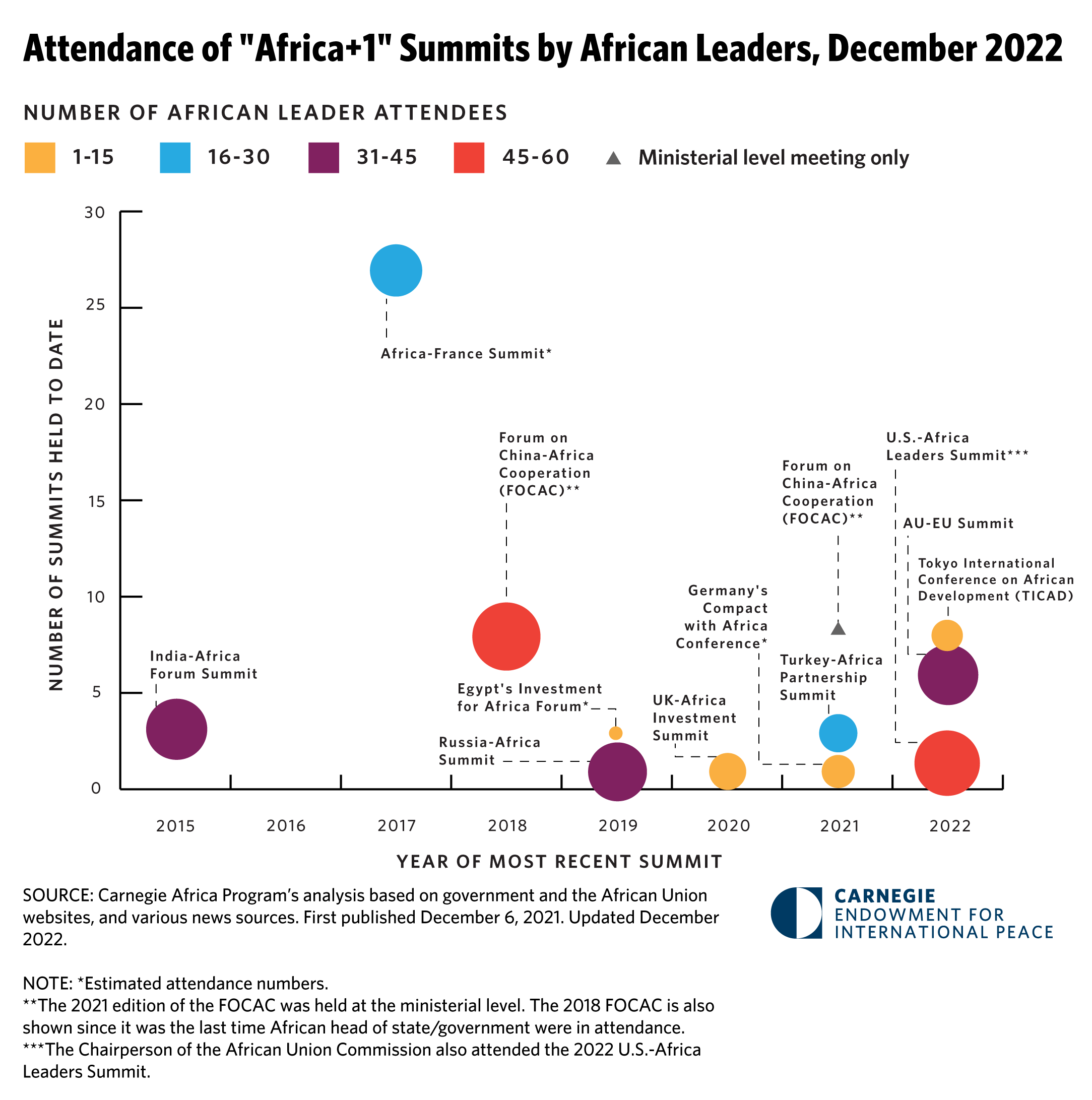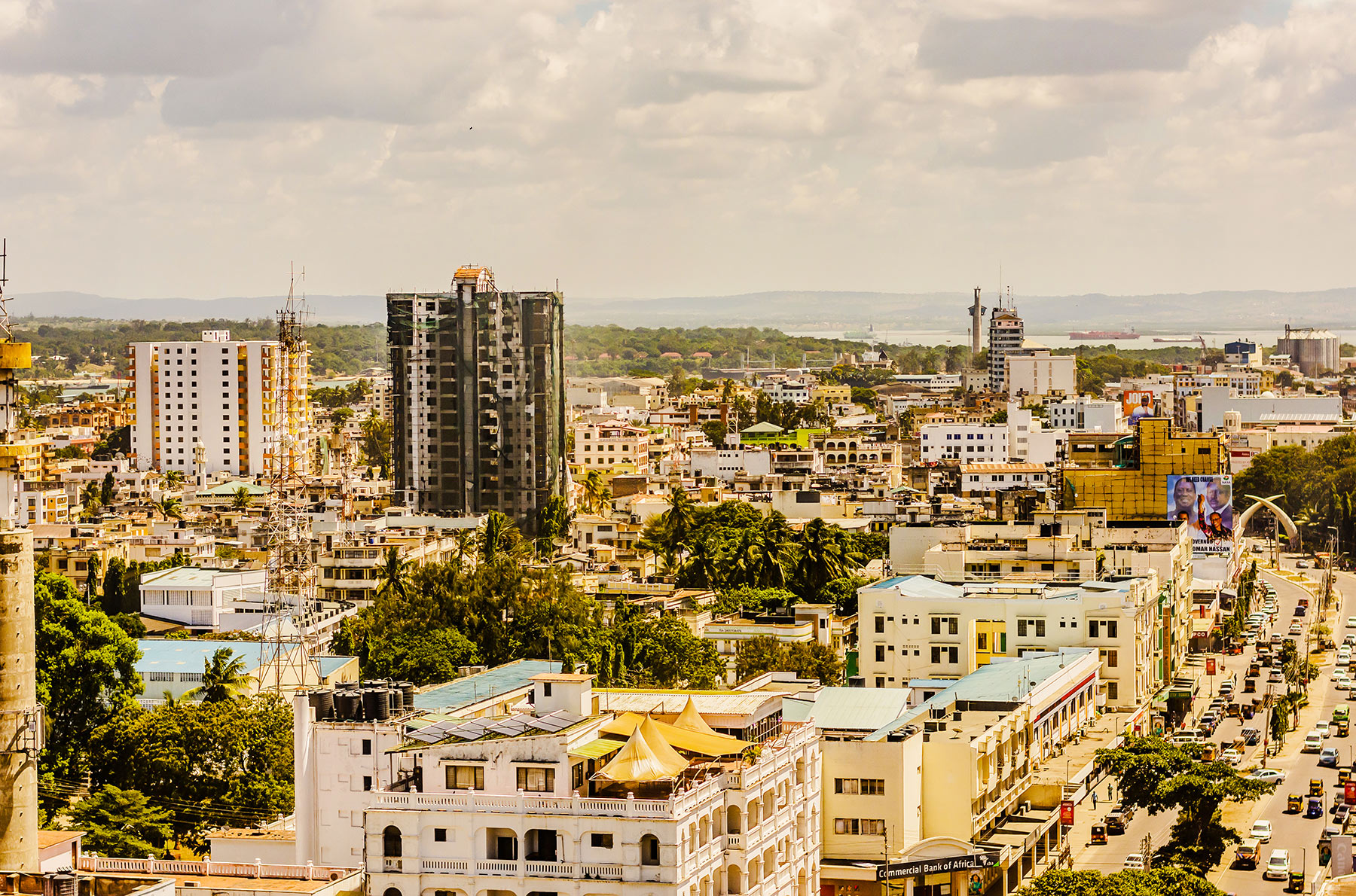DECEMBER 2022
Dear friends,
It’s been a busy end to 2022 here at the Carnegie Africa Program. We were delighted to host two side events on the margins of the recently concluded U.S.-Africa Leaders Summit. On December 12, H.E. President Hage Geingob of Namibia delivered remarks on advancing synergies between the U.S. and African countries in just energy transitions. The keynote was followed by a lively discussion featuring H.E. Dr. Amani Abou-Zeid, African Union commissioner for infrastructure and energy, and Mr. Ervin Massinga, principal assistant secretary for African affairs at the U.S. Department of State. On December 13, we welcomed Kenya’s minister of ICT, the CEO of Africa’s first tech unicorn Flutterwave, the CEO of Smart Africa, and the Chief Technology Officer of USAID to Carnegie to speak about efforts to promote inclusive digital transformation in Africa. Be sure to watch the recordings if you couldn’t make it in-person!
The Africa+U.S. summit is one of several “Africa+1” summits increasingly convened between African countries and their external partners worldwide (see our Chart of the Month, below). Africa Program nonresident scholar Gilles Yabi discussed the summit’s impact and key takeaways in an interview this week. As I wrote with Juliette Ovadia and Aline Abayo in a recent article, the success of this year’s U.S.-Africa Leaders Summit was made possible by key policy decisions taken by the Biden administration including the commitment of $15 billion toward new initiatives as part of a larger pledge to devote $55 billion to the continent over three years and an unprecedented shift “from aid to trade.” We track the list of new initiatives announced at the summit here. Such concrete outcomes signal the U.S. government’s commitment to reframing relations with Africa in a meaningful way. That President Biden continuously reiterated the United States’ support for UN Security Council Reform and the inclusion of the African Union in the G20 was another weighty gesture.
I was also honored to have the opportunity to testify before the U.S. House Foreign Affairs Subcommittee on International Organizations on December 13. In my testimony on modernizing U.S. international development assistance, I spoke about the need for new narratives about the role of U.S. foreign assistance that resonate globally and are better attuned to the twenty-first century. If interested, I encourage you to read the written testimony. Or check out my August 2022 Foreign Affairs article which elaborates further on how the U.S. can foster an Africa economic boom.
Lastly, we were excited to publish the first paper in our new African Investments Debates series. This essay series seeks to re-center the discourse on investments in Africa around the perspectives and needs of African countries. In this paper, prominent Kenyan economist David Ndii argues that the focus on infrastructure-led growth in Africa has been a mistaken attempt to replicate the success of the Asian Tigers. Instead, African countries should look to Latin America for development models, because increasing agricultural productivity has far greater potential for inducing broad-based growth. It is a thought-provoking read; please share widely. Over the coming months, we will publish more essays from Africa’s leading intellectuals and policy experts on the continent’s specific investment needs to position it on a path of prosperity. So stay tuned!
Carnegie Africa wishes you happy holidays and all the best in the new year. Look for our first newsletter of 2023 in your inbox this February!
Sincerely,
Zainab Usman
Director, Carnegie Africa Program
CHART OF THE MONTH

December 2022 Chart of the Month
FEATURES
With the U.S.-Africa Leaders Summit, Washington appears to be finally reframing its relationship with Africa in largely positive terms. Yet much hinges on the financing and implementation of the dozens of initiatives announced at the summit. Zainab Usman, Juliette Ovadia, & Aline Abayo
Last week, President Joe Biden welcomed dozens of African leaders to Washington for the U.S.-Africa Leaders Summit. The Biden administration wanted to send a clear message of strong re-engagement in Africa. Gilles Yabi & Matthew Duss
Unfortunately, those Western governments with decision-making power and resources to help vulnerable countries respond to the polycrisis are not inclined to use it, given domestic cost-of-living crises in G7 countries, the ongoing conflict in Ukraine, and limited domestic political appetite for international initiatives. David McNair
The agreement on a new loss and damage fund is one of the COP27 summit’s bright spots, but more needs to be done to deliver the trillions of dollars needed to finance the low-carbon transition. Zainab Usman
Instead of fixating on infrastructure, African countries should look to the experience of Latin American countries with similar resource endowments: a greater relative abundance of land than low-cost labor. David Ndii
African countries, at least so far, have been spared serious consequences from the increasingly contentious U.S.-China technology duel. But technology policy expert Jane Munga worries that may soon change in The China in Africa Podcast. Jane Munga
The IMF has been commended for its prompt and effective response to the pandemic crisis. But its contribution to resolving the climate crisis has so far been mixed. The IMF membership and the G20 need to hold the Bretton-Woods institution to account to fulfill its responsibilities to vulnerable countries. David McNair & Daouda Sembene
Despite the progression of online access, the digital divide in Africa stifles the universal adoption and use of existing and emerging technologies. This episode of the TechTank Podcast takes stock of the digital transformation in Africa and the future challenges with universal adoption and use. Jane Munga
DEVELOPMENTS ON OUR RADAR
- The government of Ghana suspends payment of eurobonds and other external debts. [The Pulse Ghana]
- Africa should accelerate industrialization while pursuing a low-carbon transition. [All Africa]
- Africa’s financial industry in Lomé seeks a ‘new balance.’ [The Africa Report]
- Africa prepares for the age of robots. [Mail and Guardian]
- Will the U.N. Tax Convention empower Africa? [Foreign Policy]
